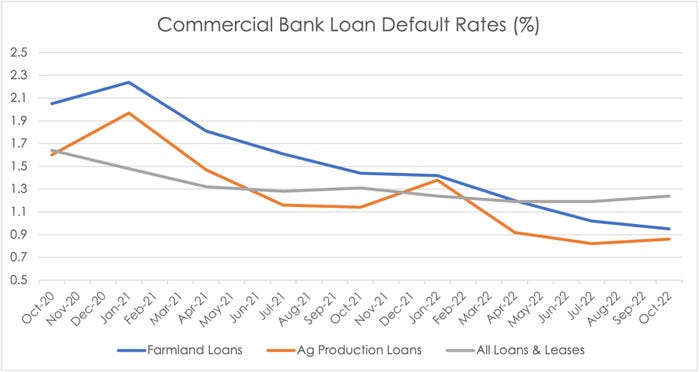May 24, 2023

By Kevin Kim and Brian E. Mills, Mississippi State University Extension Service
The overall farm financial health remained resilient and strong in the past few quarters. The agricultural loan default rates for both production and farmland loans have decreased in 2022.
Observation from the Farm Credit Administration (FCA) also shows that the percentage of nonperforming loans is at 0.47%, a very low number compared to previous years. The total number of farm bankruptcy cases (Chapter 12 bankruptcies) was 169 in 2022, the lowest number since 2004. However, the outlook appears less positive.

Source: USDA ERS
We just began the first quarter of 2023 with great uncertainty. On April 28th, it was reported that the GDP growth rate in the U.S. slowed considerably.
The annualized rate of growth was only 1.1%, half of what was forecasted. March inflation rate was higher than the expectation and reached 4.2%. There are signs of recession, including the yield curve inversion observed in the U.S. treasury. There have been massive layoffs in the tech sector, reduced corporate investments, and major bank failures on the West and the East coasts.
The agricultural sector is expected to be affected by these uncertainties. USDA’s forecast made earlier this year shows net farm income is predicted to drop significantly in 2023, by more than 13%.
If we do enter a recession and consumers tighten their budgets, there is a possibility that the impact will be even more severe and extend beyond 2023.
What can we do in the face of all these economic uncertainties? If the farm business is expected to be under financial stress in the worst-case scenarios, taking certain actions can lessen the impact. These actions fall into three strategies to improve the financial situation of the farm business.
Managing cash flow
Control costs - Reducing costs is an ongoing challenge for agricultural producers. Evaluate all procedures and purchases and seek ways to improve cost efficiency.
Reduce or postpone capital purchases and family withdrawals - Critically evaluate purchases and consider repairing for another year rather than replacing.
Other income sources - Consider ways to leverage any excess capital and labor. For example, do you have the equipment/labor/time to provide custom work for other producers?
Marketing - Sharpen your marketing plan and be ready to act on opportunities to lock in profitable prices.
Renegotiate lease - Approach the landlord with a proposal to reduce the lease payment or shift from a cash lease to a shared lease agreement.
Managing liabilities
Renegotiate loan terms - Extending loan terms will ease cash flow pressures by lowering loan payments. Refinancing carryover debt or paying interest only for a short term could be negotiated.
Reduce debt - Reducing debt will certainly relieve some financial stress but be careful about sacrificing valuable working capital. Although not easy to find, outside equity investment may be a viable source of capital and/or debt reduction.
Refinance - Carefully weigh the advantages of extended loan terms vs. today’s higher interest rates. Refinancing may not save as much as expected. If the broader economy moves into recession, watch for declining interest rates and future refinancing opportunities.
Managing assets
Liquidate cash and investments - If the farm business has maintained a financial reserve of cash or investments, this may be the time to use it to reduce or avoid debt.
Sell inventory and capital assets - If the farm business is holding inventory and waiting for higher prices, consider selling that inventory to reduce debt. If you can do it without affecting operations, selling land or equipment that is seldom used may be a good strategy to generate funds.
Source: Southern Ag Today
You May Also Like




